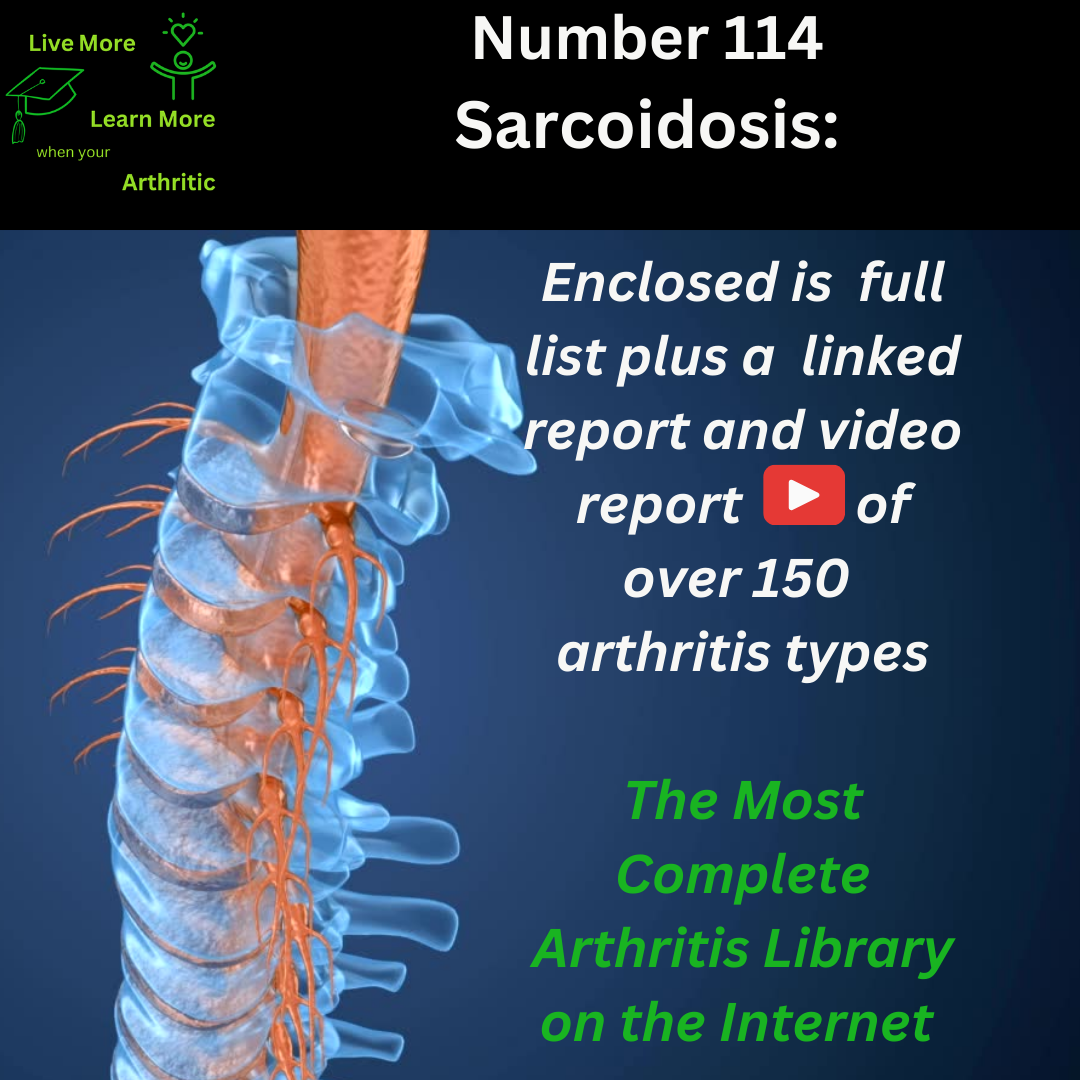
Sarcoidosis: Number 114 of around 150 types of Arthritis
Unraveling Sarcoidosis: A Complex Condition
Sarcoidosis is a multisystem inflammatory disease that can affect various parts of the body, including the lungs, lymph nodes, skin, eyes, and joints. The disease is characterized by the formation of granulomas—tiny clumps of inflammatory cells—in affected tissues. The lungs are the most commonly affected organ, followed by the lymph nodes and skin. Joint involvement in sarcoidosis can occur but is less common compared to other manifestations of the disease.
 Understanding Remission and Description of Sarcoidosis
Understanding Remission and Description of Sarcoidosis
Sarcoidosis is known for its unpredictable course, with periods of remission and flare-ups. Remission in sarcoidosis refers to a state where symptoms are absent or minimal without active inflammation or disease progression. However, achieving sustained remission can be challenging, and some individuals may experience chronic symptoms despite treatment. The exact cause of sarcoidosis remains unknown, but it is believed to involve a combination of genetic predisposition and environmental triggers, possibly related to immune system dysfunction.
Causes, Triggers, and Symptoms of Sarcoidosis
The precise triggers of sarcoidosis are unclear, but exposure to certain environmental factors, infections, or genetic factors may play a role in disease development. Common symptoms of sarcoidosis include persistent cough, shortness of breath, chest pain, skin rashes, joint pain, and fatigue. Limited range of motion in affected joints can occur due to inflammation and swelling around the joints, although joint involvement is not a primary feature of sarcoidosis.
Common Onset Age and Impact on Lifespan
Sarcoidosis can occur at any age but commonly affects individuals between the ages of 20 and 40. While sarcoidosis is not considered an autoimmune disease, it involves abnormal immune responses similar to autoimmune disorders. The impact on lifespan varies depending on disease severity, organ involvement, and response to treatment. In most cases, sarcoidosis does not significantly shorten lifespan, but complications can arise in severe cases affecting vital organs.
Risk Factors and Complications of Sarcoidosis
Risk factors for sarcoidosis include genetic predisposition, exposure to certain environmental factors (such as occupational hazards or infections), and family history of the disease. Complications of sarcoidosis can include pulmonary fibrosis (scarring of lung tissue), eye inflammation leading to vision problems, cardiac abnormalities, neurological complications, and joint deformities in rare cases of joint involvement.
Achieving a Higher Quality of Life with a Proactive Approach
A proactive approach to managing sarcoidosis involves regular medical follow-ups, lifestyle modifications, and monitoring for disease activity and complications. Avoiding smoking, maintaining a healthy weight, and practicing stress-reducing techniques can help improve overall health and quality of life. Engaging in appropriate physical activity, maintaining a balanced diet rich in antioxidants and anti-inflammatory foods, and staying informed about the disease can also support optimal management of sarcoidosis.
 Possible Complications and Interconnected Conditions
Possible Complications and Interconnected Conditions
Complications of sarcoidosis may involve other organs and systems, including the heart, nervous system, liver, and kidneys. Interconnected conditions that may coexist with sarcoidosis include autoimmune diseases like rheumatoid arthritis, lupus, or Sjögren’s syndrome. Close monitoring and collaboration with healthcare providers are essential to detect and manage potential complications and associated conditions effectively.
In summary, while sarcoidosis presents complex challenges, a proactive approach focusing on holistic care, lifestyle modifications, and regular medical supervision can significantly enhance quality of life and optimize outcomes for individuals living with this condition. By addressing symptoms, managing disease activity, and reducing risk factors for complications, individuals with sarcoidosis can lead fulfilling lives and maintain overall well-being despite the complexities of the disease.

